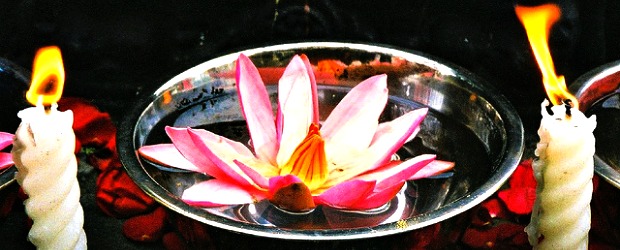You have no items in your cart. Want to get some nice things?
Go shopping
Dear Brother,
“Where are you going?” your son wants to know.
“Brar Square,” I shoot back without thinking.
Instantly, I regret my thoughtlessness. Barely six weeks ago, he saw you collapse on the floor never to rise again. A day later, he helped cremate you. Four days after that, he held the urn filled with your ashes in his small hands before emptying it into the Ganges. Already he knows far more about death than he should at eight. The last thing he needs to hear about is a visit to a cremation ground.
Luckily, his mother calls him away before he can question me further. I use that moment to make my escape.
Today is Mom’s fifteenth death anniversary and I have to go to Brar Square, because that is where you and I planted peepal trees in memory of our parents after Dad died in 2004. (Mom had already passed away in 1998 during a visit to Seattle.) Barely ten feet from where we performed Dad’s last rites was a patch of clear lawn that seemed the perfect place to go and remember them. For more than eight years we went there to mark birth and death anniversaries, to see how the trees were doing, or to simply feel closer to Mom and Dad.
Today I am going alone.
Silence crowds the car. Neither I nor the driver, who has been with the family for almost twenty years, is in a mood to talk. On the other side of the car window, Delhi seems uncharacteristically subdued as well. The pavements are empty and there is very little traffic. We don’t hear a single horn. Neem trees droop listlessly to our right and left and there is no breeze to tap on the car window. I can’t remember a morning where I saw Delhi depart so much from its normal riotous self.
We reach Brar Square in fifteen minutes. Normally, it takes close to half an hour. The driver asks to be excused right after we park. In the past, he’d come in with us to pay his respects. But today he’d rather stay in the parking lot. He looks visibly relieved when I say okay.
The tall gate outside is open. I walk through it to make my way over the cement walkway to where the four peepal trees stand. There hasn’t been a cremation this morning and the place looks serene with its sprawling trees and carpet of lawn and ducks frolicking in a small pond at the back. If it weren’t for the white-roofed enclosures meant for burning bodies, it could be mistaken for a park.
The skinny dogs that live there have sensed something is wrong. They cluster close to me, their heads wagging. One of them lets out a bark as if to ask, “Where is he?” before the caretaker shoos them away.
The caretaker asks about you as well. I start to tell him, but the words jam in my throat. I cringe at the thought of reliving your death and parrying the questions it spawns. How could it happen? Was there really no warning? He didn’t have a history of heart disease, did he…? I deflect the caretaker’s question by asking him how the trees are doing. I can see they are doing well. Three of them have grown big and are thick with leaves. The fourth one, planted later on your son’s behalf, is coming up well. But it’s all I can think of to evade a question I’m in no mood to answer.
No sooner has the caretaker finished telling me about the trees than I thrust five hundred rupees in his palm. He is taken aback; this is far more baksheesh than what he is accustomed. A smile cracks his grizzled, white-bearded face. He thanks me profusely and leaves with folded hands.
A little later, one of the caretaker’s assistants arrives with a steel bucket full of water and a plastic mug. In the past, I’d use about half the bucket and leave the other half for you. Today I have to water for both of us.
The trees appear contemplative as they loom in front of me. The breeze that has sprung up doesn’t ruffle them. The caretaker’s assistant helps with the bucket as I move from tree to tree, watering the dark trunks and the brown earth that surrounds the base. Once I am done, he lights a sheaf of incense sticks and hands it to me before leaving with the mug and the empty bucket.
I place the incense sticks on the earth in front of each trunk. Normally, I’d count to make sure that no tree gets any more or less. But today I don’t bother. By the time I reach the last one, I have run out of incense sticks. I could call the caretaker or his assistant and they’d gladly furnish more. But I don’t. I simply pick one from each one of the first three trees and make do with them.
You would have lingered to pray. All I do is fold my hands in a sign of respect and walk away to collapse in a stone seat. So many times we sat there after paying our respects and allowed the memories wash over us. Today the seat seems colder and harder than ever, even though it is the height of summer. I can make out a coffin, with a name lettered in white on the outside, waiting in the enclosure where we cremated Dad. There will be a cremation there later today.
I try to think of Mom; of her warm smile welcoming me home from school; of her chicken curry and chocolate cake; of her visit to the temple to implore the gods to watch over me when I left for college in America; of her on that night, fifteen years ago in Seattle, where she sensed her time had come and grasped my wrist with whatever strength she could muster to say, “Don’t ever forget me,” in a breaking voice…
I can’t. All I can think of is you.
I rise to my feet. The dogs watch me as I make my way slowly from the cremation ground. The caretaker meets me at the gate to ask if I have any more instructions for him. Before coming, I had thought of telling him to earmark a spot where we’d plant a tree in your memory. But I no longer have the heart.

About Vikram Kapur
Vikram Kapur is the author of two novels--Time Is a Fire and The Wages of Life. His short fiction and nonfiction have been published in a number of publications in the United Kingdom, the United States and India . These include, among others, World Literature Today, Wasafiri, Litro, Ambit, the Dublin Quarterly, New Writing, Driftwood, The Hindu, The Times of India, Frontline and Firstpost. His short stories have been shortlisted or longlisted, among other competitions, for the Commonwealth Short Story Prize, the Fish International Short Story Prize, the Summer Literary Seminars Competition and the Aesthetica Annual Creative Works Competition. He has a PhD in creative and critical writing from the University of East Anglia where he received the India-Africa bursary. He is currently Associate Professor of English at Shiv Nadar University. Right now he is working on a new novel. His website is www.vikramkapur.com

